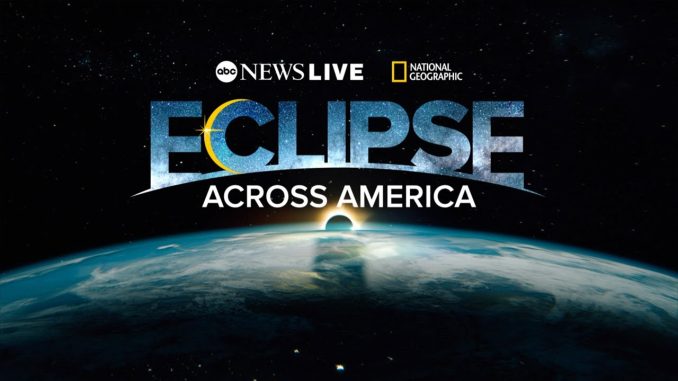
“TV doesn’t do it any justice.”
That’s what ABC News Live anchor Linsey Davis said, standing alongside “World News Tonight” host David Muir on the edge of Lake Champlain as the 2024 solar eclipse was just emerging from totality.
She’s right of course — as odd as it is to hear a TV anchor downplay the experience of watching TV. But with its two-hour live afternoon broadcast on its linear network April 8, ABC News captured a sense of beauty almost completely foreign to the TV news landscape today, and found a way to preserve this moment of time with a pristine clarity and brilliance that technology’s made possible only recently.
Other networks devoted their airtime to the eclipse. CBS cut in, as well, and spent considerable time on a mass wedding being staged when the total eclipse came to Russellville, Arkansas; CNN had a reporter at a zoo in Dallas to observe how the animals reacted to the sudden darkness; even Fox News and MSNBC briefly abandoned their, respectively for and against, round-the-clock Trump coverage. Some cliches popped up here and there: Stray comments about how great it is to see people looking up rather than down at their phones. (Though we know some in Hollywood were looking at David Zaslav today even still.)
ABC News, though, managed to capture a true sense of wonder.
An eclipse can spark the imagination of just about anyone, and cinephiles can especially appreciate what is, at bottom, simply an interplay of light and shadow. Before artificial studio light became commonplace, filmmakers also harnessed the light of the sun, whether Thomas Edison’s Black Maria studio in West Orange, New Jersey, which used a succession of skylights to control how light would spill into a scene, or as vividly captured in Damien Chazelle’s “Babylon,” filming indoor scenes entirely outdoors. What is an eclipse then but the ultimate masking effect?
ABC News showed remarkable filmmaking values in their broadcast: They scouted the perfect waterfront location for Muir and Davis in Burlington, VT, on Lake Champlain, with no one behind them to distract from the image, and understanding in advance that the sun would appear at just such an angle as to be captured in the background. A little avant-garde framing was required to set the scene, Muir and Davis, suddenly occupying the lower third of the screen, as the sun, like a dime-sized orb behind them slowly winked out and left an obviously visible corona ring in its place. Muir and Davis had to be lit from the front — it appeared dark as night around them — but never did that halo ring hanging in the sky go out of focus. Until suddenly the sun peeked out again for a “diamond ring” effect, the bit of newly visible sun gleaming like a jewel in its setting.
Only the latest generation HD cameras could have rendered both the anchors in the foreground and the corona in the background with such clarity — we were really seeing something on TV that’s never been seen before. Nature provided the drama, but ABC News was there to capture it with the most precise level of timing and staging and framing. That alone enhances the awe: That something long known and understood to happen in just such a way, does in fact happen exactly as predicted. We love surprises, but an eclipse is the absolute antithesis of a surprise — New York City residents, start planning for the total eclipse that awaits you on May 1, 2079 — yet somehow even more grand because of its knowability. And comforting too. Some things can still be planned with absolute assurance.
Muir brought unusually descriptive language to make viewers feel like they were there, waxing poetic about the “mountains and the hills surrounding the lake backlit right now by the most beautiful sunset you could imagine,” the birds “racing across the nighttime sky,” “the backlight hitting all the sailboats sitting here quietly… the water is barely moving, it’s like ice.” When do you ever get a moment like this with TV news?
For the four minutes of the totality, this instant of singularity in the sky was mirrored by a singularity on TV: Instead of focusing endlessly on what divides us, on all the conflict in the world of our own making, everyone could share a moment of common wonder, a consensus grandeur. As Muir put it, it was “a break for America.” A moment to reflect on our own place in the heavens — and it didn’t require an Elon Musk or Jeff Bezos-funded rocket to do it. Suddenly, where we sit in the overlapping spheres of family, community, and universe came into focus.
And it did that only when the light went out.
SOURCE: Indie Wire

